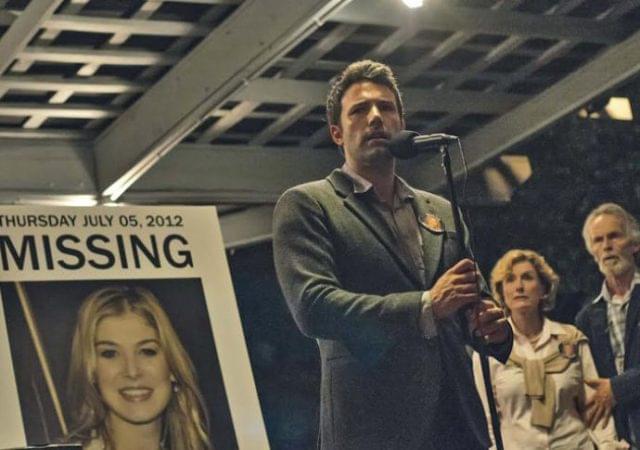
David Fincher, a sly, calculating filmmaker with a fondness for dark themes and plot twists, was a perfect match for “Gone Girl,” a 2012 novel by Gillian Flynn that’s full of both. The story was lurid, “trashy” crime fiction, but Flynn also offered insightful, incisive commentary on marriage, gender roles, and the lies we tell the people we love. Surely the man who directed “Seven” and “Fight Club” and “The Social Network” would know what to do with that.
So why does the movie version (which Flynn also wrote) feel overlong and shallow? Though Fincher stages it expertly as always, his keen eye for cinematic composition in full effect, the film is almost as conventionally tawdry and surface-level as the book’s naysayers said the book was. Oh, it’s entertaining, up to a point: frequently funny, bolstered by interesting performances, full of surprises (well, unless you already know the plot). But it has the form, not to mention the running time, of a much deeper, more nuanced film.
The gone girl is Amy Dunne (Rosamund Pike), who has disappeared from her home in North Carthage, Mo., on the morning of her fifth wedding anniversary. Her husband, Nick (Ben Affleck), an out-of-work writer who brought his New York-raised wife to his hometown when his mother got sick, falls under suspicion thanks to some circumstantial evidence and a lack of other suspects.
We see Amy in flashbacks that accompany the reading of her diary entries. These scenes reveal more of her and Nick’s marital history, or at least her perception of it. Some of it contradicts the way Nick sees things, or at least the way he tells the cops he sees them. Nick’s twin sister, Margo (Carrie Coon), never liked Amy, who “always seems to attract drama” and is the daughter of successful authors who based their series of children’s books on her. Amy’s worried parents (David Clennon and Lisa Banes) come to Missouri to join Nick in the media circus that accompanies missing women, to go on TV and plead for her safe return, that sort of thing. Everything Nick does publicly is scrutinized by a Nancy Grace-like TV reporter (Missi Pyle) and the rest of America. Is he truly a grieving, worried husband, or is he the villain?
Part of the story’s appeal is that we could see it going either way. Affleck is well cast in that regard, playing to his strengths as someone who might be a cool everyday dude but might also be a complete tool. You’re never totally sure of Nick’s sincerity, and we do learn of some legitimately scandalous things he’s done and is now doing. But come on, would he kill his wife?
Rest assured, there’s more to the story than that. It’s actually a gleefully ludicrous series of twists and turns, though Fincher’s steady, meticulous hand seems to drain it of some of its mad energy. There are engaging performances around every corner: Kim Dickens and Patrick Fugit as the sharp, fair-minded detectives; Tyler Perry as a flashy celebrity lawyer; Neil Patrick Harris as an old boyfriend of Amy’s; Missi Pyle as a Nancy Grace-type TV vulture.
Surprisingly, it’s movie newcomer Carrie Coon as Margo who really anchors the film. With such a sensationalized plot that involves so much deception and scheming, it helps to have someone down-to-earth whose mindset is more like a regular person’s. Coon’s performance gives us that: a pragmatic, rational sister who will tell her brother when he’s being an idiot.
So is it all just a big, semi-ironic soap opera? Or does it have layers? On the page, Flynn had plenty to say about the way men and women lie to each other, how they play roles for one another, and also about how public perception shapes crime investigations in the media age. Much of that commentary is missing from the film, though vestiges appear here and there. (One particularly deft moment: Fincher cutting from a flashback of Amy kissing Nick, straight to a cop swabbing Nick’s mouth for a DNA sample.) Maybe it’s just the classic book-vs-movie problem that makes one pale in comparison to the other, but “Gone Girl” is a good film that should have been great.
B- (2 hrs., 29 min.; )


